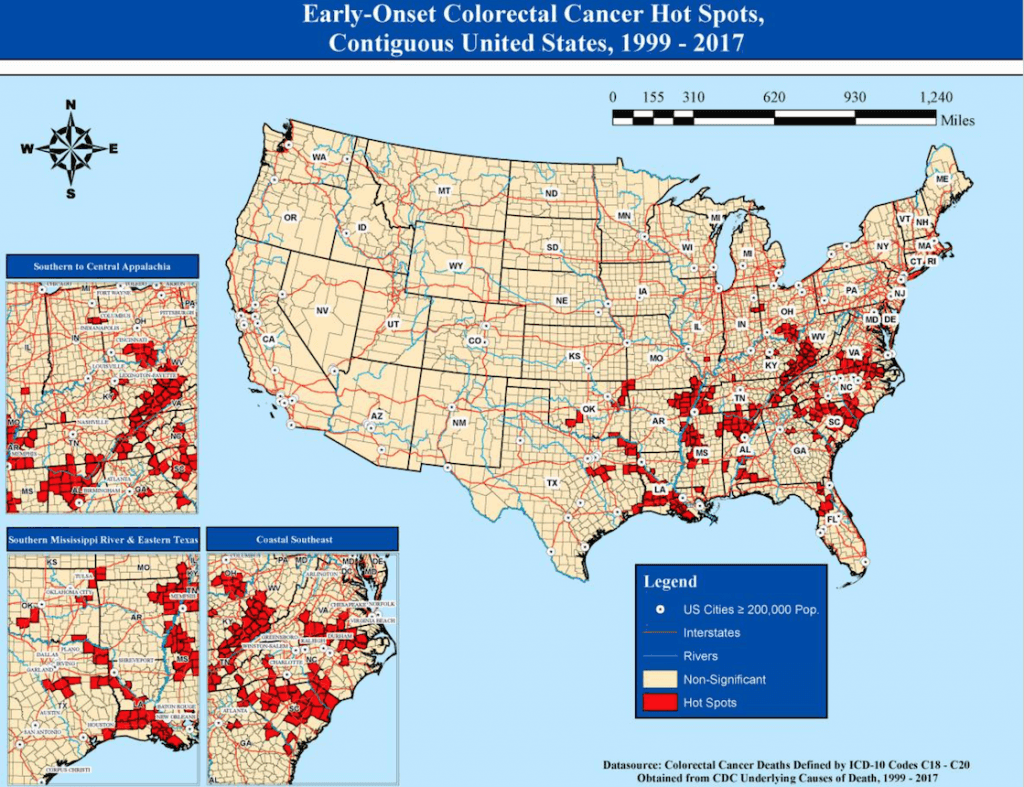Colon Cancer Hotspots: Important Things to Watch Out For

Colorectal cancer survival in the United States has improved significantly over the last 30 years. But in younger men, particularly those diagnosed with colorectal cancer before age 50, incidence and mortality due to colorectal cancer are on the rise. Studies have also shown that among patients with early-stage colorectal cancer, racial disparities have grown more pronounced.
Where Are the Colon Cancer Hotspots?
Researchers at the University of Utah are working to better understand these factors in young people with colorectal cancer so they can help improve outcomes and reduce related disparities from this preventable disease. They’ve found that many of these new diagnoses are occurring in counties in the lower Mississippi Delta, west-central Appalachia, and eastern Virginia/North Carolina.
These hotspots – where colorectal cancer is on the rise and killing young men at higher rates – revealed several trends about who these men are and how their cancer progresses. The research shows that young, non-Hispanic Black men living in those areas listed above are part of a group that’s showing an alarming trend of increasing rates of early-onset colorectal cancer. These men are also more likely to die of the disease as compared to other racial groups.
The study revealed 232 hotspot counties for early-onset colorectal cancer in the U.S. The majority of these counties are in the south, including parts of southeastern Kentucky.
What Factors Were Studied in These Hotspots?
Researchers studied a variety of factors, including age, race, tumor stage and grade, treatment approach, and marital status. In the hotspot counties, they identified that death rates in non-Hispanic Black and Hispanic men with early-onset colorectal cancer outpaced other racial groups studied.
Other factors, such as smoking, were studied. Researchers found that, while 14% of all U.S. adults are smokers, 24% of the adult population in the hotspot areas are smokers.
Should I Get Screened for Colorectal Cancer if I Live in a Hotspot Area?
Researchers recommend that adults younger than 45 should talk with their healthcare providers about early detection screening for colorectal cancer, especially if they have symptoms of colorectal cancer, a family history of the disease, or live in the hotspot counties identified in the study.

What Are the Symptoms of Colorectal Cancer?
The signs and symptoms of colorectal cancer include:
- A persistent change in your bowel habits, including diarrhea or constipation or a change in the consistency of your stool
- Rectal bleeding or blood in your stool
- Persistent abdominal discomfort, such as cramps, gas, or pain
- Weakness or fatigue
- Unexplained weight loss
Many people with colorectal cancer experience no symptoms in the early stages of the disease. When symptoms do appear, they’ll likely vary, depending on cancer’s size and location in your large intestine.
Learn More About Colorectal Cancer at Baptist Health?
To find out your risk of colorectal cancer, take our Colon Cancer Health Risk Assessment. If you have any questions about your results, schedule an appointment with a Baptist Health provider today.


